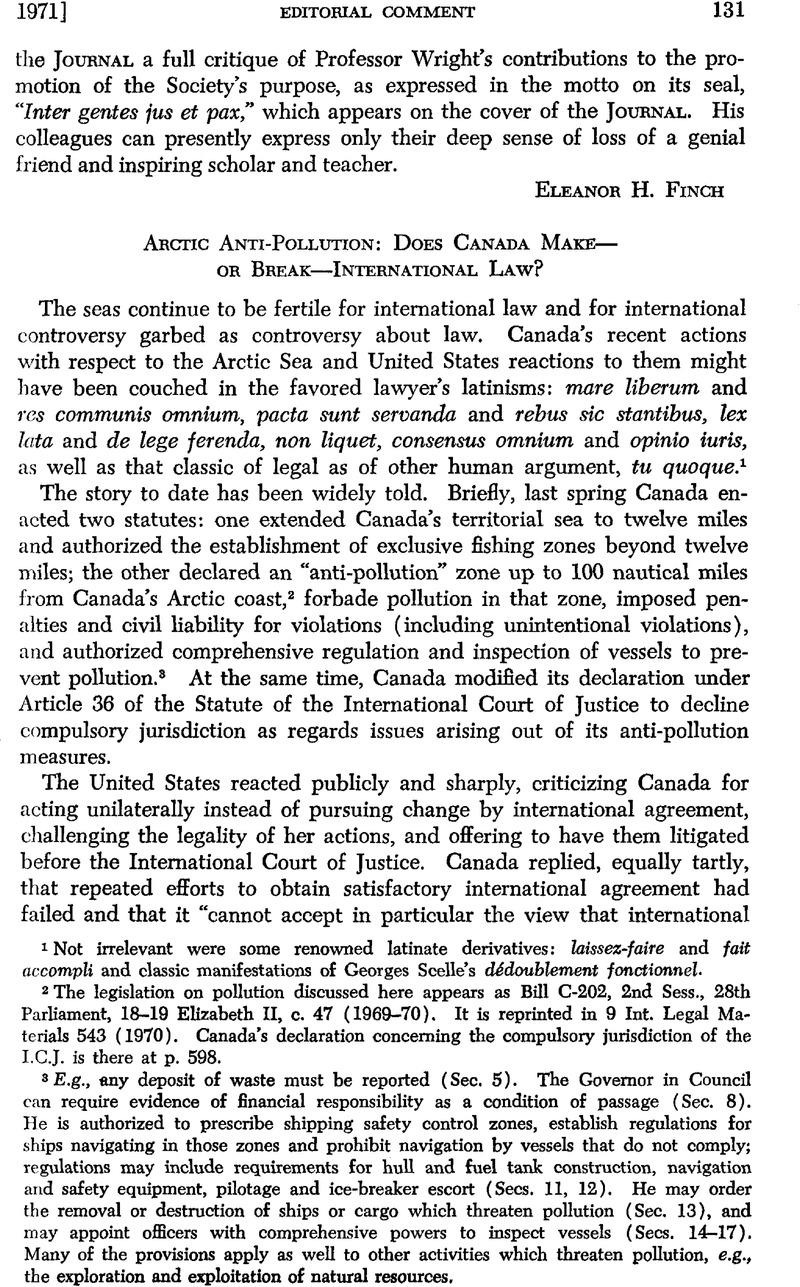Published online by Cambridge University Press: 28 March 2017

1 Not irrelevant were some renowned latinate derivatives: laissez-faire and fait accompli and classic manifestations of Georges Scene’s dédoublement fonctionnel.
2 The legislation on pollution discussed here appears as Bill C–202, 2nd Sess., 28th Parliament, 18–19 Elizabeth II, c. 47 (1969–70). It is reprinted in 9 Int. Legal Materials 543 (1970). Canada’s declaration concerning the compulsory jurisdiction of the I.C.J, is there at p. 598.
3 E.g., any deposit of waste must be reported (Sec. 5). The Governor in Council can require evidence of financial responsibility as a condition of passage (Sec. 8). He is authorized to prescribe shipping safety control zones, establish regulations for ships navigating in those zones and prohibit navigation by vessels that do not comply; regulations may include requirements for hull and fuel tank construction, navigation and safety equipment, pilotage and ice–breaker escort (Sees. 11, 12). He may order the removal or destruction of ships or cargo which threaten pollution (Sec. 13), and may appoint officers with comprehensive powers to inspect vessels (Sees. 14–17). Many of the provisions apply as well to other activities which threaten pollution, e.g., the exploration and exploitation of natural resources.
4 See Summary of Canadian note of April 16 Tabled by the Secretary of State for External Affairs in the House April 17. 9 Int. Legal Materials 607 (1970).
5 The International Convention relating to Intervention on the High Seas in Cases of Oil Pollution Casualties, signed at Brussels, 1969, reprinted in 64 A.J.I.L. 471 (1970), empowers states to “take such measures on the high seas as may be necessary to prevent, mitigate or eliminate grave and imminent danger to their coastline . . . following upon a maritime casualty.” This presumably permits action by the coastal state only after an accident has occurred. The other Brussels Convention on Civil Liability for Oil Pollution Damage (ibid. 481) imposes liability on shipowners, but there is a ceiling on liability in the absence of fault. These conventions do not deal at all with other sources of pollution. Canada alone voted against the Liability Convention, and its subsequent unilateral action no doubt partly reflects its dissatisfaction with those convention
6 Art. 24 of the Convention on the Territorial Sea and Contiguous Zone. 52 A.J.I.L. 840 (1958).
7 See Arts. 24 and 25 of the Convention on the High Seas, quoted below, note 10.
8 Forty–four states, including the United States and Canada, signed the 1958 Convention on the Territorial Sea and Contiguous Zone, and some 35 have adhered to it. While most states (including Canada) have not bothered to adhere, few have questioned it–and it is commonly accepted that the convention is generally only a codification of customary law.
Unilateral regulation of tanker construction in particular would make it possible for one state controlling an important passage to prescribe tanker specifications for the whole world. Compare Bibb v. Navajo Freight Lines, Inc., 359 U.S. 520 (1959), where the United States Supreme Court invalidated as imposing an undue burden on interstate commerce a regulation by the State of Illinois requiring interstate trucks to have a new kind of mud–guard which might contribute to safety but which was different from that required by other States.
9 See the Canadian reply, cited note 4 above, at p. 60
10 Art. 24 of the Convention on the High Seas provides:
“Every State shall draw up regulations to prevent pollution of the seas by the discharge of oil from ships or pipelines or resulting from the exploitation and exploration of the seabed and its subsoil, taking account of existing treaty provisions on the subject.”
Art. 25 provides:
“1. Every State shall take measures to prevent pollution of the seas from the dumping of radioactive waste, taking into account any standards and regulations which may be formulated by the competent international organizations.
“2. All States shall co–operate with the competent international organizations in taking measures for the prevention of pollution of the seas or air–space above, resulting from any activities with radioactive materials or other harmful agents.” 52 A.J.I.L. 848 (1958).
There is no provision for enforcement but unilateral enforcement is not expressly excluded.
The Convention on the Prevention of the Pollution of the Sea by Oil prohibits the discharge of oil from vessels within large coastal zones. Both the United States and Canada are parties, the United States with reservations. The convention provides for enforcement by the flag state of an offending vessel, but regulation by the coastal state is not expressly excluded.
Compare Art. 2 of the 1958 Convention on the High Seas which provides, inter alia, that the” freedom of the seas must be exercised “with reasonable regard to the interests of other States in their exercise of the freedom of the high seas.”
11 The United States concluded special agreements with several coastal states to ensure passage of the nuclear vessel Savannah through their territorial seas. Compare the Agreement for Co-operation in Dealing with Pollution of the North Sea by Oil, June 9, 1969. These and other suggestions as to how Canada might have acted to avoid giving comfort to the coastal-state onslaught against the law of the sea would not, of course, all be equally effective or equally pass legal muster.
12 Mr. Justice Brandeis dissenting in DiSanto v. Pennsylvania, 273 U.S. 34, 37, 42 (1927).